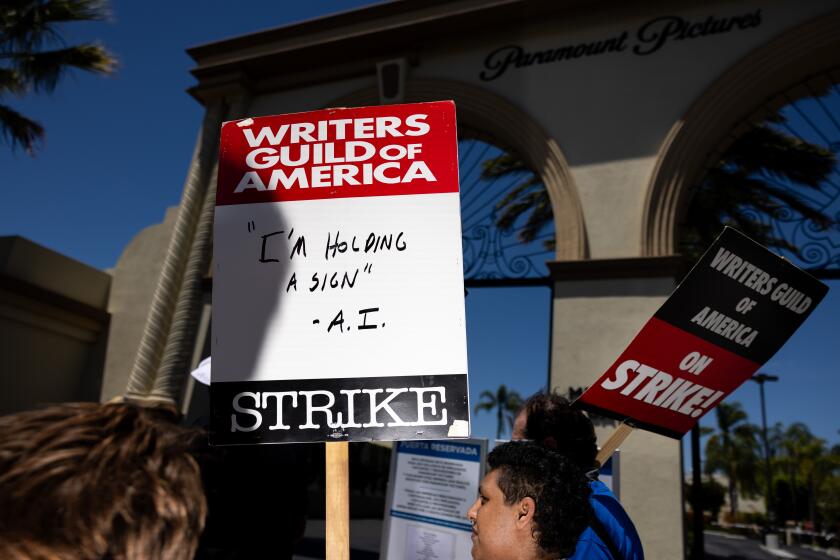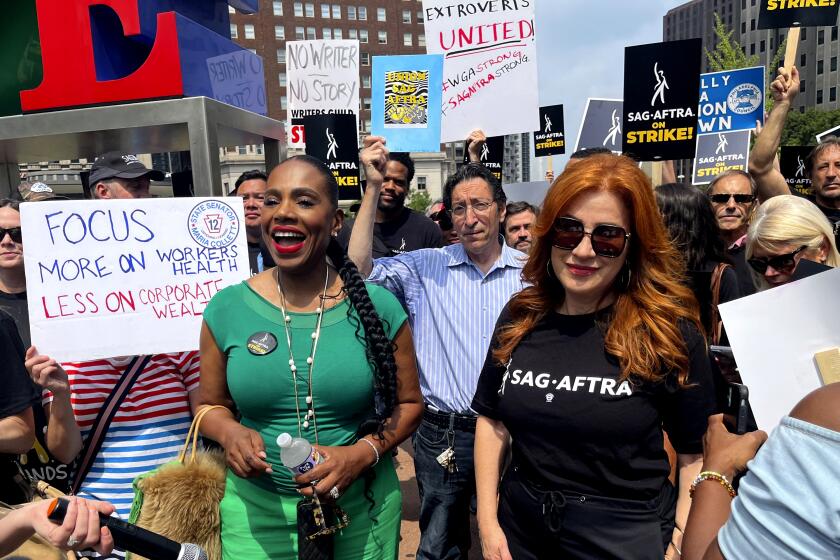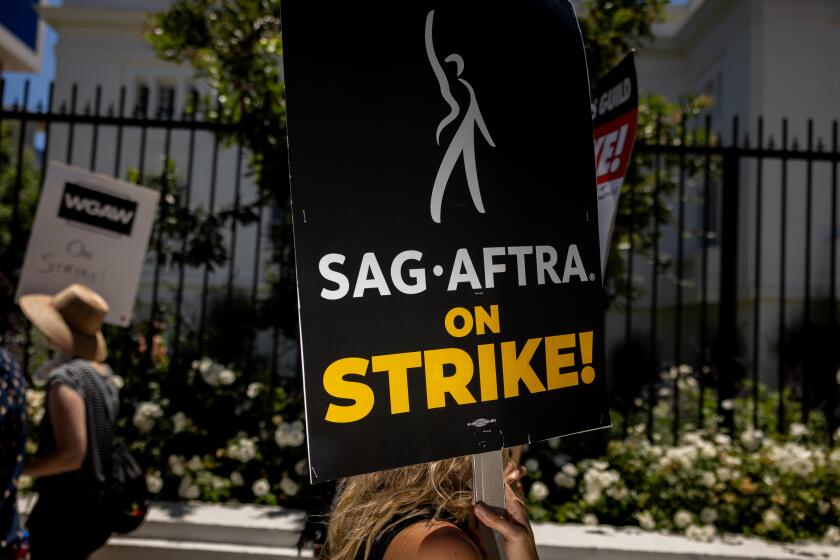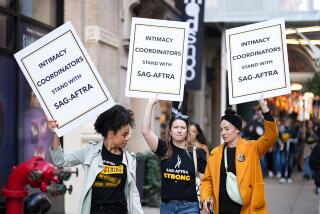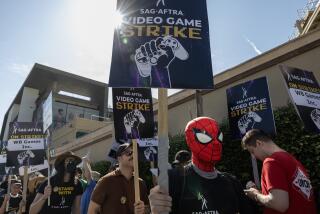Column: Dear SAG-AFTRA, don’t feel pressure to make a deal. This contract is too important
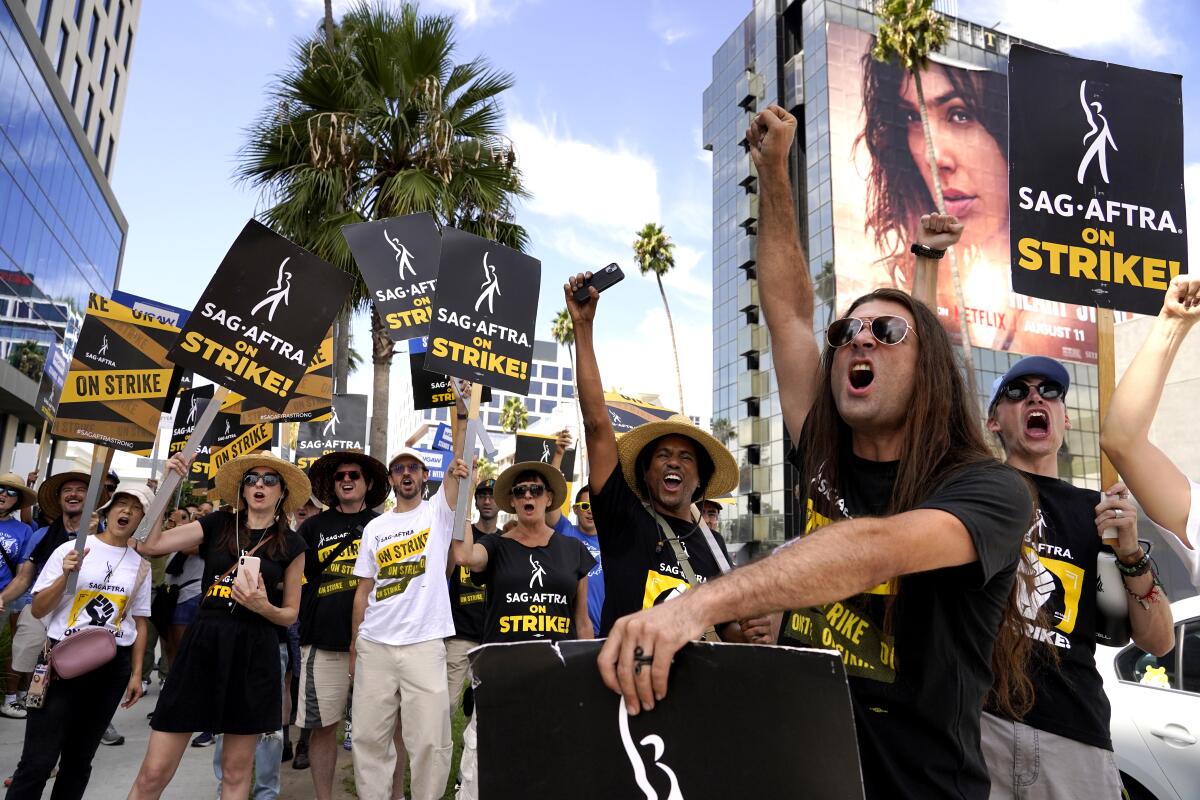
- Share via
It would be great if this week’s talks between the Screen Actors Guild-American Federation of Television and Radio Artists and the Alliance of Motion Picture and Television Producers, which represents the studios, turn out to be as fruitful as last week’s final meetings between the AMPTP and the Writers Guild of America.
It will only be great, however, if SAG-AFTRA, like the WGA, gets offered a deal it is happy with. And that is not a foregone conclusion.
The power of a dual strike was formidable, and some have suggested that with the writers back to work, the actors have lost some of their leverage.
Of course, back in June, some also suggested that the Directors Guild of America’s swift acceptance of a new contract would undercut the writers’ strike, and look how that turned out.
The actors should not feel pressured to agree to a new contract simply because the WGA has. They should not be viewed as holdouts, keeping Hollywood from finally getting back to work. Almost 10 times bigger than the WGA, SAG-AFTRA, which recently called a strike for video game performers, has a wide-ranging field of issues to address.

Subscribers get exclusive access to this story
We’re offering L.A. Times subscribers special access to our best journalism. Thank you for your support.
Explore more Subscriber Exclusive content.
It is not the actors’ responsibility to bring Hollywood back to life. It was not the actors who created the problems that forced two incredibly disruptive strikes, any more than it was the writers. The studios created a system in which working actors can no longer earn a living wage in their chosen profession, and it’s up to the studios to change that.
And while the actors share many of the writers’ demands, including pay raises and better residual systems, as SAG-AFTRA president Fran Drescher recently observed, one size does not fit all — particularly when it comes to the use of artificial intelligence.
Concerns about AI were a sticking point in the now-ended writers’ strike. But equivalent issues could prove stickier for actors, who remain on strike.
As my colleague Brian Contreras recently reported, AI poses an immediate and visceral problem for actors, who do not have the same sort of copyright protections granted writers; not surprisingly, AI appears to be a much bigger sticking point in the negotiations.
Technology that has been used to de-age some stars, including Harrison Ford and Robert De Niro, and totally resurrect others, such as Carrie Fisher, Harold Ramis and Paul Walker, has been viewed with increasing alarm.
Are actors in danger, as Drescher warned this summer, of being replaced by machines?
It is, perhaps, alarmist to fear a near-future without lead and supporting performers — even the best digital enhancement requires an extra suspension of belief; it’s most believable if viewers agree to squint. But background actors do appear to be in immediate danger of losing their livelihoods altogether.
The stories that have circulated all summer of background actors having their bodies scanned, often without warning or the ability to decline, aren’t just chilling in a general cue-the-dystopia, “Minority Report” kind of way. Such practices by the studios pose a threat to the acting profession as a whole.
As any actor will tell you, it is difficult to get work in Hollywood without an agent and nearly impossible to get an agent without being at least eligible for SAG-AFTRA. So how do you become SAG eligible?
In many cases, through background work.
Several TV showrunners speak to The Times about the end of the writers’ strike and how sadness and frustration over the negotiations temper their joy.
For thousands of working actors, appearing as the young woman eating a muffin to the left of a conversation between two comedic leads, as the nonspeaking hospital worker in an emergency room scene or as one of the criminals being silently processed as a cop drama unfolds is the first step in achieving any kind of career in Hollywood.
In the 2005 series “Extras,” Ricky Gervais built an entire (and darkly hilarious) show around the hopes, fears and realities of background workers — and, as that show illuminates, there are no guarantees.
Many background actors are already members of SAG-AFTRA, and they get priority in casting. Only SAG-AFTRA-sanctioned productions offer the vouchers that count toward potential membership, and they often do not have enough vouchers to go around. (You need three to become eligible.)
Sign up for This Evening's Big Stories
Catch up on the day with the 7 biggest L.A. Times stories in your inbox every weekday evening.
You may occasionally receive promotional content from the Los Angeles Times.
Many actors who become “SAG eligible” do not immediately join the union, either. Even with SAG-AFTRA membership, background work does not ensure finding an agent or getting more work. But remaining “eligible” offers the flexibility of auditioning for SAG productions (and joining the union if a job is offered) while still being able to act in non-SAG projects.
The loss or diminishment of background acting roles could take a huge toll on the industry by making it even more difficult for young or new performers to launch their careers. And not just through union eligibility. As with the writers guild’s fight to ensure that more writers remain on staff throughout production, background work can offer a crucial introduction to working on a film or TV set — an instant tutorial in professional terms and protocols, the chance to see a professional cast and crew in action.
SAG-AFTRA has approved a deal from the studios to end its historic strike. The actors were on strike for more than 100 days.
Not to mention, of course, the money. Many actors depend on regular background work to make ends meet while auditioning for bigger roles, just as many nonactors do it to augment their income in a way that does not involve driving a Lyft or working for DoorDash.
More than any other part of the filming process, it offers the chance for just about anyone to experience the magic of Hollywood.
Just as the writers pushed back against what they characterized as an existential threat to their profession, so too have the actors. And like the writers, they should not be pressured to leave the table quickly, with anything less than what thousands of actors have walked the sweltering picket lines for: a contract that everyone in their union and profession can live with for the next three years.
More to Read
Sign up for This Evening's Big Stories
Catch up on the day with the 7 biggest L.A. Times stories in your inbox every weekday evening.
You may occasionally receive promotional content from the Los Angeles Times.
